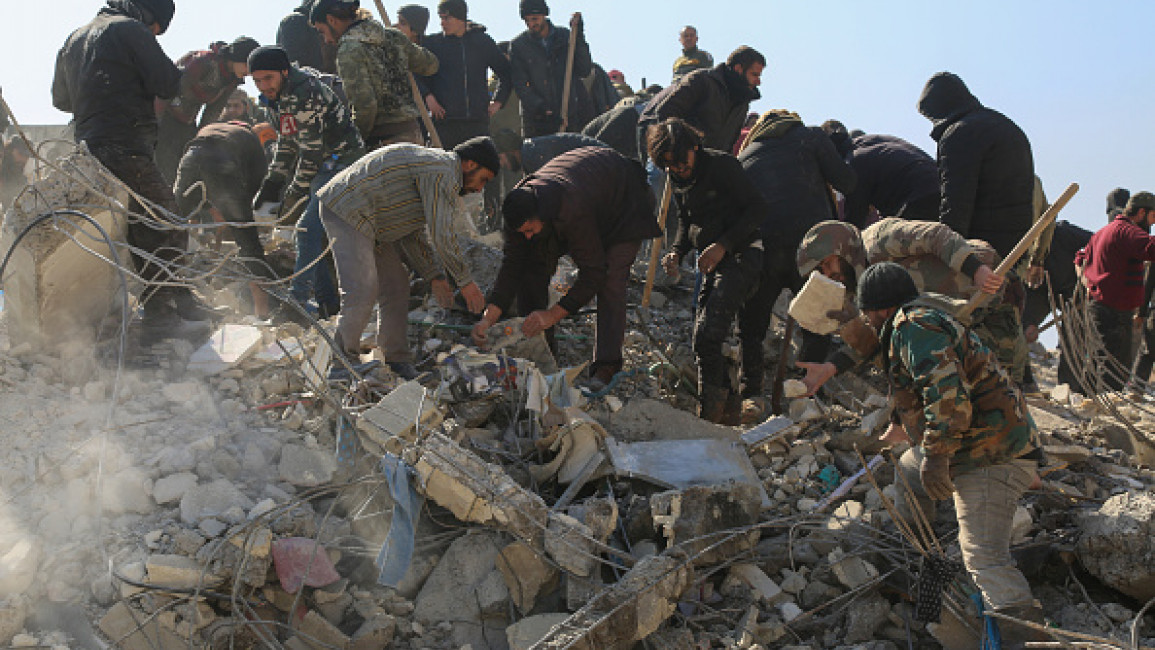Kurds allege looting, aid discrimination by Turkish-backed militas in Syria after earthquake
Kurdish civilians and monitoring bodies have accused Turkish-backed militias of looting and aid discrimination in northern Syria in the aftermath of the devastating earthquake which hit Syria and Turkey on 6 February and killed over 47,000 people.
Northern Syria, specifically the cities of Jinderis and Afrin, was one of the worst affected areas by the earthquake.
Humanitarian relief has poured into the area, with countries like Saudi Arabia and Qatar, as well as international NGOs distributing aid.
At least five residents of the area and three Kurdish monitoring organisations who spoke with The New Arab alleged that the Turkish-backed militias which control the area have distributed aid in a discriminatory manner, as well as engaged in looting.
"They [militias] told us if we wanted aid, even a tent, we would have to go to an IDP camp in Deir al-Balout [about 15 km from Afrin]. Arab families did not have to do this," Reem, a Kurdish civilian from Afrin speaking under a pseudonym out of fear of repercussions, told TNA.
Her extended family – about 30 people – have taken shelter in her father's home as their own homes are damaged. They say they have not benefited from any of the humanitarian aid which has been sent to Afrin.
Reem fears that if her family leaves the home to receive aid, militias will steal their possessions or occupy the house itself.
"No one dares to leave the house, because they are scared that as soon as they leave it, it will be stolen out from under them," Reem said.
"All of these tragedies have stacked on one another. I can't describe my feelings in words. If they steal the house where we all grew up, there's nothing that will keep me tied to Jenderis," she added.
Ahmad (also a pseudonym), a farmer living in a village 5 km from Afrin, said that after residents ran out of their homes during an aftershock on 20 February, they returned to find their possessions stolen.
"My neighbour had two of her solar panels stolen, as well as a gas canister," Ahmad told TNA.
Ahmad and others, blame the looting of homes on militias which govern the areas, but it is difficult to verify who is responsible and if it is part of an organised policy rather than a product of general lawlessness.
Since 2018, Afrin has been controlled by the Turkish-backed Syrian National Army (SNA), a loosely-governed coalition of opposition militias.
Several of the militias, such as the Abu Amsha militia, have been accused of widespread extortion, arbitrary kidnappings and generally terrorizing the residents of Afrin.
"They divide up the areas, then loot the collapsed buildings. They tell people they have to leave the buildings because they are not safe, then steal from them," Rashid Shabaan, a lawyer and member of the leadership committee of the Kurdish Democratic Union Party (Yek-Dem), told TNA.
Shabaan further claimed that there have been instances of corpses being looted before burial if they were wearing jewelry or other valuables.
TNA was unable to independently verify these claims of corpse looting, but five other sources also alleged that corpses, in some cases of relatives, had been looted by militiamen.
"My neighbour's aunt was taken out [from the rubble] and she had gold on her. They put her in the car to take her to the mortuary, but then her corpse disappeared. After three days, they found her under a tree in a remote area," Ahmad said.
In addition to looting, there have been allegations of aid discrimination, particularly against Kurdish residents.
"There are people who are taking large quantities of aid, especially Arabs coming from surrounding areas. But the Kurds in Jinderis are not getting aid, we’re not even getting tents," Reem said.
Ibrahim Sheikho, the Director of the Center for Human Rights in Afrin, told TNA that they have recorded cases of Kurdish families having to buy tents for as much as US$300.
The tents, donated as part as the humanitarian relief effort, are meant to be given to families for free.
"The factions are appropriating the aid and selling it, or giving it to their own families. The earthquake has created a new opportunity for theft," Mahmoud (a pseudonym), a media activist in Afrin, said to TNA.
"There was racist discrimination in the rescue operations, in the digging of graves and also in the distribution of aid," Mahmoud added.
Mahmoud Hufar, the president of the Jenderis Civil Council, denied that looting is a significant problem in the area, saying that the cases of looting "have occurred" but are "very limited."
Hufar also denied that there was discrimination in aid provision, but instead blamed the perception of discrimination on a general scarcity of aid in the area.
"The amount of aid was very limited. Every citizen feels as if they are not getting enough, and they interpret this based on their personal circumstances, if they’re Kurdish or from Damascus, for example," he told TNA.
Sheikho and Shabaan say that the alleged discrimination in aid and looting are part of a greater policy of "demographic change" whereby Turkish militia seek to push out Kurdish residents of the area.
Kurdish residents have fled en-masse from the area since the SNA took over the area.
Amnesty International in 2018 recorded "a wide range of violations, mostly at the hands of Syrian armed groups that have been equipped and armed by Turkey." The organisation has documented cases of enforced disappearances, looting and arbitrary detentions.



